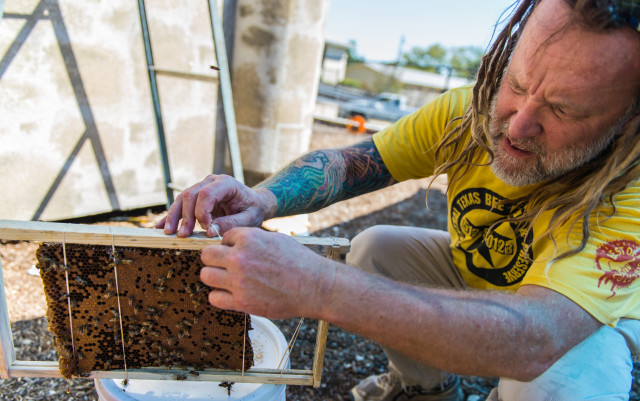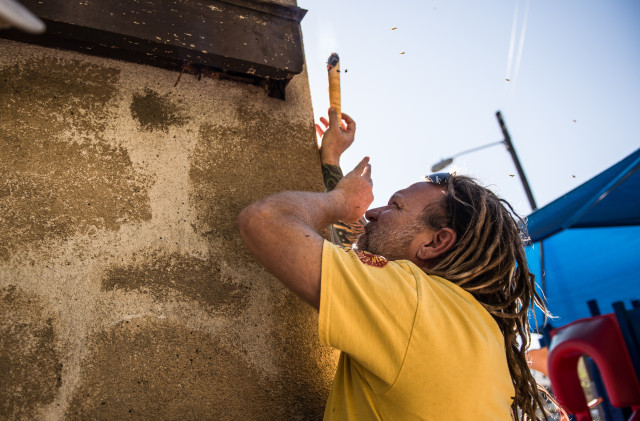‘Bee Czar’ and Austin Billionaire Team Up to Rescue Pollinators
By James Grandberry
Reporting Texas

Walter Schumacher, the “bee czar,” works on a bee colony at Highland Park Baptist Church in Austin. Amalia Diaz/Reporting Texas
Walter Schumacher was at the W Austin Hotel downtown two years ago when a man with a ponytail approached him.
“I like your dreads,” the man said, referring to Schumacher’s long blond dreadlocks.
That chance encounter led to one of Austin’s most unusual business partnerships, one that pairs Schumacher, a professional bee rescuer, with John Paul DeJoria, the ponytailed owner of Patron Tequila and the Paul Mitchell hair products company, and one of the richest men in the world. Forbes magazine recently estimated his net worth at $2.9 billion.
Schumacher, 51, owns Central Texas Bee Rescue, a nonprofit that gently removes honeybee hives from homes and other places where they’re unwanted and relocates them. DeJoria, 71, is his financial backer.
DeJoria told Reporting Texas that he helps Central Texas Bee Rescue because the world’s bee population is vanishing and the consequences could be dire. “If bees go, about half our agriculture goes, which means humans start dying, too,” he said. “I think it was a great investment for me to do for mankind.”
DeJoria supports a number of other environmental causes, including the Sea Shepherd Conservation Society, which protects whales and other marine life, and the Waterkeeper Alliance, which works on global clean water projects. He said he decided to invest in the bee rescue to help expand the business and “to show people that bees are cool.”
No one wants to encounter a cloud of wings and stings while mowing the lawn. But a growing awareness of the important role that bees play in ecosystems has spurred a greater interest from homeowners and businesses in safely relocate them. Schumacher said that lately his company has been busier than ever.

Walter Schumacher confuses bees with smoke so he can see the size of a hive. Amalia Diaz/Reporting Texas
“I’ve got hives from Brownsville to Amarillo, Beaumont to San Angelo,” said Schumacher, who’s known as the “bee czar” and is known in the bee community for removing hives while without wearing any protective gear – just a T-shirt, shorts and sunglasses.
For almost a decade, scientists have warned the collapse of bee colonies could trigger a worldwide food crisis.
Bees pollinate around 30 percent of our crops every year, according to the National Resources Defense Council. Pesticides, parasites and habitat destruction have led to a sharp decline in the bee population.
Politicians in Texas and across the nation have taken note. In 2012, the Austin City Council mandated that hive-removal companies relocate bees instead of killing them. Earlier this year, the White House published the National Strategy to Promote the Health of Honey Bees and Other Pollinators.
Removing a hive can cost from $300 to $1,000, depending on its size and location, according to several Austin companies. Central Texas Bee Rescue operates on donations. Schumacher tells his customers about a “suggested donation” for his services but said he loses money on most removals. DeJoria makes up the difference, he said.
Schumacher relocates some of the hives to his apiary in Buda and sells the honey they produce, along with beeswax lip balm and other products — ideas that came from DeJoria. Central Texas Bee Rescue also places hives in locations including the top of the W Austin Hotel.
Because of the partnership with DeJoria and revenue from bee product sales, Schumacher’s company is able to thrive. Each of his crews can remove three to four hives a day, sometimes encountering unexpected hazards.
On an October day, employee Lance Morgan was up on a ladder in South Austin, removing a hive of 30,000 bees from beneath the eaves of a house. Suddenly, Morgan was in full retreat. “Ah . . .” he yelled, shouting out a curse word. “There’s fire ants up there.”
Morgan’s protective suit didn’t stop an army of tiny biting ants from crawling inside. He ran down the ladder, sprayed himself down with a hose, then scurried back up to keep working.
About 30 minutes later, Schumacher arrived to check how the job was going. He went up the ladder in his street clothes examined the hive and came back down, without a single sting or ant bite.
This is how his crews remove hives: The worker exposes the hive and removes the comb, placing it in a wooden frame. Whatever honey or other residue is left is scraped off and kept for use in products. The worker gently sweeps some of the bees with a brush into a dustpan and puts them in a box with the comb. The rest are collected with a device Schumacher designed. A small vacuum connected to a Tupperware container gently sucks up as many of the bees as possible — especially the queen, to prevent her from rebuilding the hive.
Schumacher said he’s nearly quit three times because of money troubles or problems with one of his the 10 Texas crews he has operating in Texas. He faced another setback when the Oct. 30 storms destroyed hundreds of his hives at the Circuit of the Americas racetrack near Elroy.
Each time, something has happened that gave him hope. Schumacher calls them his “meant to be” moments.
The last one occurred just earlier this year. Schumacher was doing an especially tough removal inside a church. He had reached a breaking point after more than 100 of his hives were stolen in Houston.
“I was like, (expletive) it,” he said. “I’ll get a job. Nobody cares.”
“I head into this church, and then one of my guys said ‘Hey, turn around and look at that.’ So I turn around and behind me, there’s a five-foot beehive in stained glass. So I figured, I’m in the right place.”